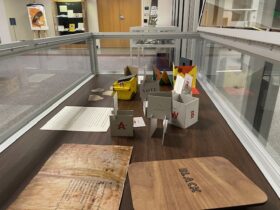
By Katie Ellis| OCTOBER 8, 2012
U.S. Sen. Kirsten Gillibrand on Oct. 8 visited Binghamton University to announce the America Innovates Act — federal legislation to spur the growth of new science and technology jobs in the Southern Tier and across New York state. The bill is designed to help scientists and researchers secure valuable resources and training to help commercialize their discoveries and create marketable products, new high-tech companies and jobs.
“High-tech innovation is the future of our economy and Binghamton University is paving the way. Your students and researchers are doing incredible things,” said Gillibrand, after touring the Center for Autonomous Solar Power at the University’s Innovative Technologies Complex. “Many researchers lack the resources to turn their scientific breakthroughs into jobs. We need to bridge that disconnect. I know we can have a thriving economy for years to come and want to accelerate the process to bring ventures to market.”
“This legislation will help us do what we do – better,” said Binghamton University President Harvey Stenger. “It will help us educate, innovate and improve community outreach through economic development. Our faculty are working on world-changing technology and this act will spur new high-paying, high-skilled jobs in the Southern Tier.”.
Gillibrand said the legislation will create or strengthen “proof of concept” funding that will allow researchers to test products to prove that they are practical. Universities would also be able to use grants to hire additional staff for specific experiments, purchase testing equipment, test products in an industrial setting, and access expert advice in business strategy and patent and regulatory laws. Funds could also be used to build business incubators or other facilities that would support researchers.
To help build the next generation of innovative leaders, this legislation would also provide business training for graduate students in science, training students in intellectual property protection, commercialization and product development, Gillibrand said. “Universities would also be encouraged to develop professional science master’s programs and graduate degrees that will provide students with the skills they need to pursue careers in industry.”
Binghamton University is already a leader in establishing industrial partnerships and collaborations that can speed the commercialization of products. According to Bahgat Sammakia, vice president for research, 10 percent of Binghamton’s research activities are conducted with industrial partners – nearly twice the national average. “Binghamton will continue to enrich this entrepreneurial environment and to seek solutions to real-world problems,” he said.
Adding her voice in support of the legislation, Assemblywoman Donna Lupardo said New York state is one of the top research states, “yet we struggle with the investment needed to commercialize products. This legislation is essential to benefit SUNY, develop a network of colleges and universities and support the Regional Economic Development Council’s efforts to create a high-tech incubator in downtown Binghamton. It is truly a way to revitalize our jobs and our manufacturing base.”





